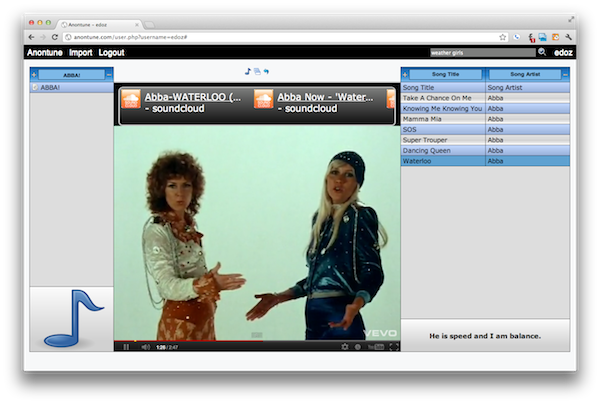
Piracy site Newzbin2 closes for good
Newzbin2, a site offering links to pirated content, hit the headlines back in November 2011 when a successful court case brought by the Motion Picture Association led to it being blocked by a number of major ISPs in the UK, including BT, Virgin Media, Sky, and TalkTalk.
The website responded in bullish fashion by rolling out an encrypted software client to circumvent the ban and switching to a Spanish domain to avoid the threat of domain seizure, but the adverse publicity meant that payment providers were unwilling to work with the site, leaving the owners unable to pay the hosting costs. Despite this, Newzbin2 struggled on, offering an increasingly unreliable service, until today when it finally closed for good.

One in six UK users download or stream media illegally
A new report from Ofcom reveals that one in six Internet users in the United Kingdom access films, TV shows, music, or eBooks through illegal means. Published this week, the first results from an ongoing study of Internet users aged 12 and above also reveals that 47 percent are unsure whether the online content they download, stream or share is legal or not.
During the three-month period from May to July 2012, Ofcom found that the levels of infringement varied considerably depending on content type. For example, while 8 percent of users accessed music illegally and 6 percent consumed films that way, just 2 percent downloaded games and software. That said, of all the computer software obtained online, 47 percent of it was acquired illegally.

Kim Dotcom's MEGA has found a new home
It would be an understatement to call the past year a wild ride for Kim Dotcom, founder of MegaUpload, but the New Zealand entrepreneur has not slowed down. Dotcom is preparing his latest website, MEGA, after losing control of his former site. He originally secured the me.ga URL using the Gabon top level domain, but then lost it recently when the Gabon government announced they would not host the new site. Still undeterred, Dotcom has taken to Twitter to blame the United States government for pressuring Gabon. He also talked there of plans to continue to pursue his new website.
Earlier today, Dotcom once again logged into his Twitter account, this time to announce that MEGA has found a new home -- "New Zealand will be the home of our new website: http://Mega.co.nz - Powered by legality and protected by the law."

Razer Synapse 2.0 is a good idea gone wrong
Some computer games require you to be connected to the Internet at all times to play them. While that sounds reasonable for online multiplayer games such as World of Warcraft or Team Fortress 2, it doesn't make sense for single-player games that you play on your own. Always-On DRM limits access to the purchased game due to that requirement.
Not only is it necessary to have an Internet connection to play the game, which means no playing in situations where you do not or where unreliable, it also means that you rely on the game company server to be online as well.

UK ISPs are told to block more pirate sites
The music industry has tried various things to combat piracy over the years, ranging from actually selling music online, to suing alleged file sharers/customers. In the United Kingdom, the British Phonographic Industry is trying to force internet service providers to block access to infringing sites.
The Motion Picture Association started the trend last year by going to the courts and asking them to block access to Newzbin 2, a members-only site sharing music and video. The BPI followed its approach, successfully getting the High Court to order ISPs to block access to The Pirate Bay, and now it’s got three more major torrent sites in its crosshairs.

Republicans: Friends of Technology?
In case you haven't already noticed, it's the quadrennial presidential election season in the United States; the time when the two dominant political parties state their goals and methods of attaining them, and work to put their chosen party leader into the office of President of the United States.
At the Republican National Convention this week, the Republican party both nominated Mitt Romney as its candidate for president, and outlined its platform, its "statement of who we are and what we believe."

FBI shuts down third-party Android app stores for piracy
The Federal Bureau of Investigation and Department of Justice Intellectual Property Task Force announced on Tuesday that they had for the first time shut down third-party Android app stores for piracy: applanet.net, appbucket.net, and snappzmarket.com. The three domains are now in the custody of the U.S. government and in their places are FBI shutdown notices.
In the last twelve months, the FBI has seized hundreds of domains related to various illicit activities, including "carding" (selling stolen credit card information), the sale of counterfeit merchandise, wire and bank fraud via botnet, and, in the case of Megaupload organized crime.

Google wants a slice of Apple’s pie, starts punishing pirate sites
It had to happen eventually. Representatives of the media and entertainment industries have been complaining for years about Google linking to sites that offer copyrighted content, accusing the Internet giant of not doing nearly enough to prevent access to infringing material. The company’s stock response has always been that it only indexes the web, and the results that appear when someone types a query into Google simply reflects the sites that people go to, and other sites link to. It’s a fair argument, although one somewhat undermined by last year’s algorithm update that targeted content farms, and showed the company’s willingness to tweak what sites appear where in its index.
Google does of course remove pages when it receives copyright removal notices to do so. In fact, in an effort to demonstrate just how actively, Google recently expanded its Transparency Report to show how many URLs it removes, from where, and at whose request. The figures are staggering. In the last month alone, Google removed over 4.3 million URLs from its index.

Anonymous targets Ukraine for Demonoid torrent tracker takedown
This week, the loosely connected online activist and hacking community Anonymous began a new "operation": attacking the Ukrainian government.
In retaliation to Ukraine's take down of popular BitTorrent tracking site Demonoid, Anonymous is seeking "revenge against all criminals responsible" in the country's government.

Dead Trigger is now free on iOS too, but is piracy really to blame?
A week after Madfinger Games made much to-do about piracy driving its decision to make first-person zombie shooting game Dead Trigger free on the Android platform, the game developer has now done the same for the iOS version.
Those who purchased the game while it was 99 cents will be given in-game currency 25 gold and ten casino chips in the 1.1.2 update. Unlike last time however, there is no grandstanding from CEO Marek Rabas on a privacy problem on Apple's mobile platform. All we know is that Madfinger is moving to a "freemium" model with Dead Trigger, and in one case, blamed it on piracy.

Piracy is killing Android
It sounds like a silly question. After all, Android is more popular than ever, with new “hero” phones and tablets arriving almost every week. However, for all of the platform’s success, there’s one aspect that remains a lingering blight on Google’s otherwise shiny success story: Software piracy.
Simply put, the rampant piracy of apps on “rooted” Android devices is killing developer momentum, with many devs resorting to unpopular and often intrusive in-app advertising and other gimmicks to make up for the gap in traditional Google Play revenue. And with the Android enthusiast community seemingly obsessed with “rooting” every new device that comes to market -- thus making it easier for unscrupulous users to pirate apps and/or bypass normal app security mechanisms -- the problem only gets worse.

Who says Google promotes piracy?
Perhaps the question should be: Who doesn't? Google search is a powerful tool for finding content of any kind, including copyrighted material posted without permission. Today Google sets the record straight, by releasing the URLs copyright holders request removed from search: 1,246,713 over the last month. These came from more than 1,000 copyright holders directed at about 24,000 domains.
Apparently more details about other copyright areas will come later. For now, search is priority, with Google planning to update requests daily. The report available on Wednesday offers data through yesterday.

RIAA's Waterloo? Anonymous Looks to set streaming music free
Streaming music content is too restrictive, believes hacktivists Anonymous. Six members of the group have released Anontune, a web-based application that aims to aggregate streaming music online and place it in a central location. AnonTune currently accesses the catalogs of YouTube and SoundCloud, although the developers plan to add content from other services including Yahoo Music, Myspace Music, Bandcamp and others in the future.
True to the groups name, users will be able to listen to tracks anonymously, and Anonymous itself will not store the tracks. Instead it depends on the catalogs of the services it aggregates, thus leaving the sticky copyright issues to those sites. Recording Industry Association of America's Waterloo, indeed. The next one, if Napster wasn't enough a computing generation ago.

Indian ISPs commanded to block over 100 music Websites for alleged piracy
Responding to a complaint from trade group IMI (The Indian Music Industry,) the High Court in Calcutta, India ruled that access to 104 alleged copyright-infringing music websites must be blocked at ISP level. India's Internet service providers will utilize DNS and IP-based blocking as well as deep packet inspection to block access to the long list of sites.
"This decision is a victory for the rule of law online and a blow to those illegal businesses that want to build revenues by violating the rights of others," Frances Moore, chief executive of worldwide recording industry rights group IFPI said on Thursday. "It highlights the importance the Indian courts place on the creative industries and their contribution to the economy. The court ruled that blocking is a proportionate and effective way to tackle website piracy. The Indian government should build on this progress by moving forward legislation to effectively tackle all forms of digital piracy to enable the country's digital music market to reach its full potential."

BitTorrent's effect on movie ticket sales is greatly exaggerated
Despite the protestations of the movie industry over the harm BitTorrent incurs to its bottom line, there is an ever increasing amount of evidence that this is not true -- at least here in the United States. University of Minnesota and Wellesley College's study does show that internationally there is a correlation, but this is likely more to do with the considerable lead time the United Stats enjoys in movie releases.
The study finds a seven percent decrease in box offices revenues on average as a result of piracy. The amount of loss widens as the lead time increases, indicating there is some relation between the two. Essentially, the power to reduce losses as a result of BitTorrent lies within the industry itself.
